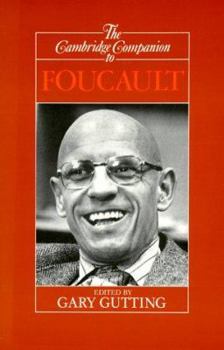The Cambridge Companion to Foucault
(Part of the Cambridge Companions to Philosophy Series)
Select Format
Select Condition 
Book Overview
For Michel Foucault, philosophy was a way of questioning the allegedly necessary truths that underpin the practices and institutions of modern society. He carried this out in a series of deeply... This description may be from another edition of this product.
Format:Paperback
Language:English
ISBN:0521408873
ISBN13:9780521408875
Release Date:February 1994
Publisher:Cambridge University Press
Length:374 Pages
Weight:1.18 lbs.
Dimensions:0.9" x 5.8" x 8.9"
Customer Reviews
2 ratings
The Cambridge Companion to Foucault
Published by Thriftbooks.com User , 15 years ago
Excellent series of articles on the major work of Foucault--It includes two great articles on the focus of his last works relative to --Ethics of the Self--vis-a-vis the Care of the Self. Interestingly the previous edition also included a breakdown of Ethics from a Foucault perspective--the three articles are very much a great sequence on these concepts--they should all be included on the next edition since the evolution of his thought is evident in their progression. A great research asset on this major figure of social, political and philosophic thought in the twentieth century.
Important commentaries on an important philosopher
Published by Thriftbooks.com User , 27 years ago
In various interviews and commentary on his work, Michel Foucault had constantly offered conflicting interpretations and elusive pronouncements exemplifying the complex and dynamic nature of meaning which was a critical subject of his writings. In the positive spirit of this tendency, the twelve essays in the Cambridge Companion to Foucault provide differing and illuminating considerations of Foucault's thought as well as incisive descriptions of the greater philosophical debates which have been affected by Foucault's work. Editor Gary Gutting offers an instructive introduction to the volume which provides a valuable framework for interpreting Foucault in general, and the subsequent commentaries in particular. Following Foucault himself, Gutting describes the need for a (re)thinking of the concept of interpretation. Instead of engaging in a futile search for the essential interpretation of a text, multiple and conflicting accounts of a work should be lauded as the outcome of a process of critical consideration. As such, Gutting invokes a conception of esthetics--redolent of the trajectory of Foucault's last works--to orient a consideration of Foucault and his commentators. He likens Foucault to an artisan whose histories and narratives are valuable in their specific context as products of a particular intellectual endeavor; like any work of art, however, they are subject to varying uses and interpretations when they are presented to an audience. Thus the essayists in this volume represent an audience of admiring critics who provide unique insight into Foucault's work. The essays by Flynn, Gutting, Canguilhem and Rouse confront the major issues of Foucault's early career: most notably what kind of "histories" was he writing and how do concepts of subjectivity, power and knowledge operate in these histories. Perhaps the most illuminating essay in the book is that on "Power/Knowledge" by Joseph Rouse. Rouse's intention is to clarify Foucault's position on the relationship between power and knowledge and answer criticisms as to the source of sovereignty in Foucault's thought. Rouse demonstrates how Foucault conceived of power not as an entity ontologically exogenous to social relations but rather as a dynamic process which is conceived and executed in a multiplicity of social locations. Knowledge, similarly, is born of distinct social relations and likewise mutable. Rouse grounds Foucault's conception of power in an embodied lived existence which finds its ethical legitimacy from historical experience without resorting to universal essentialisms which concepts like sovereignty intimate. The chapters by Davidson and Bernauer and Mahon illuminate Foucault's notions of ethics in a useful fashion. Davidson discusses Foucault's debt to ancient Greek philosophy in elucidating the self's relationship to itself by placing this relationship in the realm of a lived style of life. This chapter and Bernauer and Mahon's complement each other






